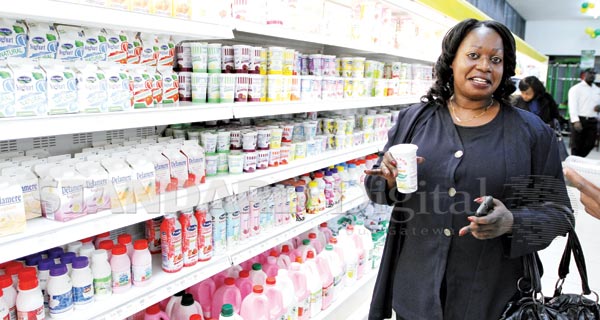 |
|
A shopper at a local supermarket. There are fears that due to effects of the VAT Act 2013 on prices, the cost of living could rise to double digits by end of this month. |
By Jackson Okoth and Winsley Masese
Kenya: Unscrupulous traders are robbing shoppers in broad daylight by applying value-added tax (VAT) to exempt foods items, piling pressure on weary consumers.
A survey of retail outlets and markets across the country by The Standard Wednesday revealed that supermarkets and other retail outlets had increased the price of bread along with other essential goods even though the former was excluded from the list of items subject to VAT on September 2.
Other food prices that have been irregularly hiked by retailers are those of maize fl our, rice, fresh eggs, tomatoes and onions.
In an open admission of this market failure, Cabinet Secretary to the National Treasury Henry Rotich Wednesday urged businessmen not to take advantage of the law to exploit consumers.
The new VAT law passed by Parliament in August has already rumped up the prices of milk, electricity, fertiliser, cooking gas, newspapers, maize and other cereals, vegetables and cooking oil among others on a long list of items.
A spot check by The Standard reveals plans by many consumers to tighten their household budgets in the face of the price hikes.
“I will be forced to buy milk for the children while I will switch to porridge myself,” said Daphine Omolo, a middle income resident in Nairobi.
The price of a half litre packet of fresh milk of all leading brands has increased from Sh45.00 to Sh60.00. Brookside products of the same quantity have almost doubled from Sh55 to retail at Sh85.00.
The increases have touched off a torrent of condemnation of the government as insensitive.
Also on the spot is Parliament, which was persuaded by government to pass a Bill styled to be accommodative on the surface but whose design exposes the poorest to a punitive tax.
A consumer rights lobby Wednesday questioned the constitutionality of the VAT Act, claiming that the law purports to take away the rights and privileges offered under the supremacy of the Constitution of Kenya 2010 under Chapter 4 of the Bill of Rights.
Mysterious circumstances
“We pointed out all these issues to Parliament’s Committee on Finance, Trade and Planning,” said Stephen Mutoro Secretary General, Consumers Federation of Kenya (Cofek).
“The National Treasury, however, bribed the MPs out of any amendments by paying the Sh1.1 billion vehicle grants on the day the VAT bill came up for voting before the House. Numerous amendments that had been lined up were shelved under mysterious circumstances.”
The VAT Act, on whose back Treasury seeks to raise some Sh10 billion, was signed into law on August 14, 2013 and took effect on September 2 — immediately pushing up prices of basic and most essential commodities by more than 16 per cent.
The lobby group says the National Treasury has suspiciously rushed the controversial VAT Act (2013) into effect without putting in place mechanisms for a seamless transition from the repealed Cap 476.
“As a result, confusion reigns both for the market as well as for consumers. Implementation of the VAT Act will spawn more challenges than the noble intentions behind it,” warns Mutoro.
At the time of lobbying Parliament to pass the Act, the National Treasury argued that it would rather tax consumption to stimulate production.
Experts warned that in theory, that would have worked. In practice, however — and given a complex market largely controlled by cartels rather than Government — the rise and rise in consumer prices will be unstoppable, they argued.
Cofek warns that Kenya risks transforming into a fully-fledged black market economy, with less tax collection within a booming counterfeit goods market.
There are fears too that due to effects of the VAT Act 2013 on prices, the cost of living could rise to double digits by end of this month.
“We would have counseled the National Treasury and Parliament to delay operationalisation of the VAT Act, 2013 to a later date,” said Mutoro.
In Mombasa, the price of milk and other consumer goods has gone up, eliciting a public outcry among many residents.
Wednesday, fresh milk prices rose by about 10 shillings from the previous Sh45 to Sh55 in supermarkets and Sh60 in some of the retail shops.
Treasury was successful in pushing through amendments to the VAT Act after previous attempts failed. It all began in July 2011, when Treasury prepared a draft VAT Bill for consultation.
Based on these consultations, Treasury then tabled before Parliament a revised VAT Bill 2012, which received a lot of negative publicity. This was because the bill sought to tax basic foodstuffs and essential commodities.
This year, the same bill was tabled by Treasury — with minor amendments — bringing back the loud protests and intense lobbying in Parliament.
But with the VAT Bill 2013 now passed into law, it is the middle and low-income households that will be hard hit, pushing most essential items out of their daily and monthly shopping lists.
In the case of Jackline Kathini, a housewife with three children in Umoja, Nairobi, the choices are stark.
“A recent increase in the price of half a litre of milk to Sh40 forced me to reduce my daily purchases. If there is an increase again due to tax, then I may be forced to seek other alternatives including cutting down,” said Kathini.
Her monthly shopping list includes bare essentials, with her kitchen stock levels not able to last the entire month.
—Additional reporting by Joackim Bwana
 The Standard Group Plc is a multi-media organization with investments in media
platforms spanning newspaper print operations, television, radio broadcasting,
digital and online services. The Standard Group is recognized as a leading
multi-media house in Kenya with a key influence in matters of national and
international interest.
The Standard Group Plc is a multi-media organization with investments in media
platforms spanning newspaper print operations, television, radio broadcasting,
digital and online services. The Standard Group is recognized as a leading
multi-media house in Kenya with a key influence in matters of national and
international interest.
 The Standard Group Plc is a multi-media organization with investments in media
platforms spanning newspaper print operations, television, radio broadcasting,
digital and online services. The Standard Group is recognized as a leading
multi-media house in Kenya with a key influence in matters of national and
international interest.
The Standard Group Plc is a multi-media organization with investments in media
platforms spanning newspaper print operations, television, radio broadcasting,
digital and online services. The Standard Group is recognized as a leading
multi-media house in Kenya with a key influence in matters of national and
international interest.










